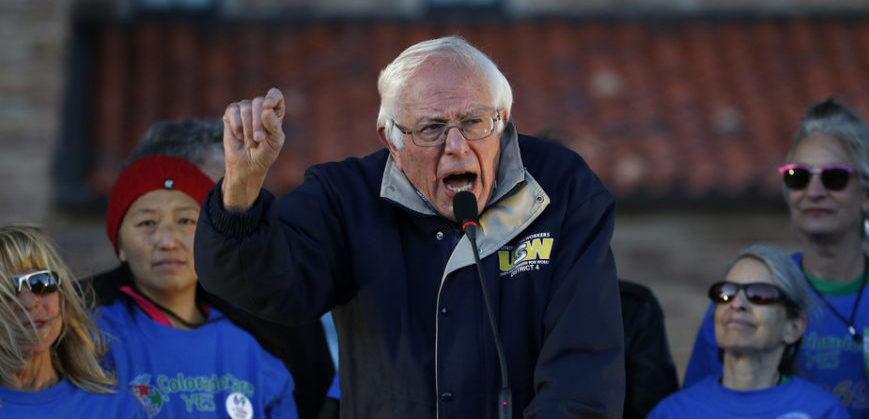Editor’s note: Anders Fremstad, assistant professor of economics at Colorado State University, wrote the following article for The Conversation, an independent collaboration between editors and academics that provides informed news analysis and commentary to the general public, in November 2016. Colorado State has recently joined The Conversation as a partner institution, and the list of participating faculty and researchers is expanding every day.

Bernie Sanders at a recent rally in support of ColoradoCare, a universal health care initiative. The Associated Press
Coloradans will vote Nov. 8 on a plan that would provide all state residents with health care when they need it. Amendment 69 would replace an inefficient private insurance system with a cooperative insurer that would cover Coloradans similarly to how Medicare covers our seniors.
The measure, called ColoradoCare, builds on the Affordable Care Act, which has succeeded in expanding health insurance coverage but failed to stop the rise of health care costs. The average premium on Colorado’s health insurance exchange will rise by 20 percent in 2017, and voters are looking for solutions. If Coloradans pass Amendment 69, Colorado could lead the way in health care reform in the same way it led the way in the legalization of recreational marijuana in 2012 – which is on the ballot in five states this year.
ColoradoCare would be funded primarily by a new payroll tax. It would cost employees 3.3 percent of their paycheck, and employers would pay 6.7 percent of payroll – significantly less than most workers and businesses spend now on insurance premiums, deductibles, and co-pays. Voters can use ColoradoCare’sonline calculator to see how the measure would affect their bottom line.
As an economist who has closely studied the numbers related to ColoradoCare, I support ColoradoCare, because I believe it will help the state. Here is why.
Cutting administrative waste
The opposition to Amendment 69 claims that “paying for such a system amounts to a $25 billion tax increase for the state, nearly doubling the size of Colorado’s current $27 billion budget.” However, a careful analysis by the Colorado Health Institute, a nonpartisan think tank that has taken no stance on the amendment, finds that ColoradoCare can cover 350,000 uninsured Coloradans and improve coverage for a million Coloradans while reducing total health care expenditures.
Amendment 69 generates these savings by cutting the unnecessary administrative waste that constitutes 20 percent of health care spending under the current system. International evidence suggests this is possible: Countries with universal health care systems spend a third less than the U.S. on health care but achieve better health outcomes.
The economics of private insurance
These data suggest that ColoradoCare would be an economic boon for the state, but critics view the plan as needless government intervention in an ideal market. What’s wrong with the economics of the private insurance system, and how will ColoradoCare fix it?

www.shutterstock.com
First, the market for private health insurance is incredibly complex. There are dozens of plans for sale on Colorado’s health insurance exchange with a wide range of premiums, deductibles, copays, coinsurance rates and provider networks. While this ostensibly gives individuals and families the ability to purchase the insurance that is right for them, most people cannot accurately compare plans.
A recent experiment finds that only 11 percent of participants were able to calculate the cost of a hospital stay under a hypothetical insurance policy. Another study shows that most people purchase plans that will ultimately cost them more than an available alternative. Insurance companies carefully craft their policies to exploit the fact that we are not human calculators. ColoradoCare allows people to focus on health care rather than health insurance.
Second, the health care market is monopolistic, and private insurers make that problem worse. In competitive markets, like the market for bicycles or peaches, consumers can buy goods from a variety of sellers. This is not always possible in health care, because many communities depend on a single hospital or clinic. However, health insurance companies exacerbate the issue by further limiting patients’ access to narrow networks of providers.
Because health care markets are monopolistic, prices for medical procedures are not made public and vary enormously across providers. Knee replacement surgery in Denver costs anywhere from US$14,600 to $45,200, depending on the hospital. ColoradoCare lets patients pick their health care providers, improves transparency and reduces price variability.
Third, the private insurance system creates a problem that economists refer to as moral hazard. For-profit insurance companies have a financial incentive to deny needed medical coverage. Insurance companies refer to what they spend on health care as “medical loss” because it leaves less money for their shareholders and CEOs.
Insurers don’t always shirk their ethical responsibility to do what is right, but if you talk to folks with serious illnesses, you’ll hear plenty of horror stories. With ColoradoCare, no one would profit from denying coverage.
Fixing a broken model
The private insurance health care system is deeply inefficient. The market for health insurance is impossible to navigate, private insurers reduce competition between providers and for-profit insurance companies make money by denying care.
By addressing these issues, ColoradoCare is able to cover everyone for less money than Coloradans currently spend on health care. It isn’t just ColoradoCare’s supporters who understand this. Health insurance companies are spending millions of dollars to defeat Amendment 69 and keep their racket going.
Regardless of what Coloradans decide on Nov. 8 – a recent poll has it trailing by 10 percent – ColoradoCare may serve as a model for Americans searching for health care solutions. Around the country, popular pressure is rising to rein in the cost of health care. Citizens in dozens of states are demanding reforms similar to ColoradoCare. Californians are voting on Proposition 61, which would ensure that the state pay no more for prescription drugs than the Veterans Administration. As voters recognize the inefficiency of the private insurance system, it may just be a matter of time for Americans to take on big-money interests and make health care truly universal.
![]() This article was originally published on The Conversation. Read the original article.
This article was originally published on The Conversation. Read the original article.